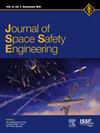应用于航天系统的人工智能技术安全设计研究与分析
IF 1.7
Q3 ENGINEERING, AEROSPACE
引用次数: 0
摘要
随着人工智能(AI)技术的快速发展,人工智能在空间系统中经常被谈论和争论。人工智能和空间系统之间的强交互是一个令人兴奋的新领域,因为人工智能系统的自主性使它们能够持续实时监控空间碎片和卫星轨道,计算潜在的碰撞风险。人工智能系统通过提前预测危险的接近,自动建议甚至执行机动以避免碰撞,确保卫星的安全和寿命。这将有助于突破目前可用资源和人员成本的限制,促进空间探索领域的新发展。然而,人工智能在空间系统中带来的每一种好处都可能带来相反的风险,表现为潜在的攻击、渗透和妥协。由于人工智能系统具有自主意识,其行为的不可预测性可能会给人们带来无法控制的情况,从而影响太空任务的完成。因此,目前人工智能与空间探索相结合所带来的问题是,人们对利用人工智能技术的空间系统的可靠性和安全性无法放心。针对上述问题,本文以空间系统中的人工智能技术为研究对象。首先,研究了人工智能技术在空间系统中的应用进展。并根据目前的主流研究理论或标准,初步确定了空间系统人工智能技术的分类。考虑到辐射、温度变化等高危环境,从数据、模型和系统三个方面分析了空间系统人工智能安全设计要点。利用基于遗传粒子群优化的粗糙集理论进行属性约简,进一步优化了空间系统人工智能安全设计的重点。希望通过本文的研究,明晰空间系统人工智能技术水平,为有效评估空间系统人工智能安全设计因素提供解决方案,强化人工智能驱动空间系统发展的显著效益。本文章由计算机程序翻译,如有差异,请以英文原文为准。
Research and analysis on safety design of AI technology applied to space system
With the rapid advancement of artificial intelligence (AI) technology, AI is frequently talked about and debated in space systems. The strong interaction between AI and space systems is an exciting new field, as the autonomy of AI systems enables them to continuously monitor space debris and satellite orbits in real time, calculating the potential risk of collisions. By predicting dangerous approaching in advance, AI systems suggest or even execute maneuvers automatically to avoid collisions, ensuring the safety and longevity of satellites. This will help break through the current limitations of available resources and personnel costs, and promote new developments in the field of space exploration. However, every benefit brought by AI in space systems may have opposite risks manifested as potential attack, infiltration and compromise. Because AI systems have autonomous consciousness, the unpredictability of their behaviour can introduce uncontrollable situations to people, which in turn affects the completion of space missions. Therefore, the current problem caused by the combination of AI and space exploration is that people cannot be assured with the reliability and safety of space systems that utilize AI technology.
In response to the above problems, this paper takes AI technology in space systems as the research object. Firstly, it investigates the application progress of AI technology in space systems. And the classification of AI technology in space systems is preliminarily determined according to current mainstream research theory or standard. Considering the high-risk environment such as radiation and temperature change, the key points of safety design for AI in space systems are analysed from the data, model and system. The rough set theory based on genetic particle swarm optimization is used to reduce attributes, and the focus of safety design for AI in space systems is further optimized.
The authors hope that through the research of this paper, the level of AI technology in space systems can be clearly elucidated, providing a solution for effectively assessing the factors of safety design for AI in space systems, and strengthening the significant benefits of AI driving the development of space systems.
求助全文
通过发布文献求助,成功后即可免费获取论文全文。
去求助
来源期刊

Journal of Space Safety Engineering
Engineering-Safety, Risk, Reliability and Quality
CiteScore
2.50
自引率
0.00%
发文量
80
 求助内容:
求助内容: 应助结果提醒方式:
应助结果提醒方式:


